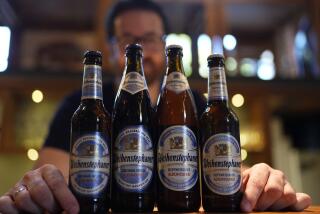Tainted Food, Wine Worry German Consumers
- Share via
HAMBURG, West Germany — “Noodles without egg on sale here” says the makeshift sign in a downtown Hamburg supermarket.
A woman shopper approaches the department hesitantly, examines one packet of noodles, then a different one and finally moves on without buying either.
West German consumers have been deeply disturbed by the adulterated-food scandals in recent weeks--anti-freeze in wine, bacterially infected egg in noodles, bromoacetic acid in beer and salmonella in frozen chickens.
As a result of the wine scandal in August, when harmful glycol was found in hundreds of Austrian and West German brands of wine, trade has dropped to almost zero.
A highly reputable public opinion organization said that only 8% of the West German population believes that wine on sale at present was of good quality.
In the first two weeks since the wine scandal broke, more than 5,000 people called the Hamburg Consumer Guidance Service and as many wrote letters.
“We had to set up a special telephone service for people inquiring about wine, otherwise other callers would never have got through,” said Sabine Zimdahl at the service. “Most of the people want to know: I have here at home this or that produce--noodles, grape juice, chickens--can I still use them at all? We generally advise them carefully to examine the list of ingredients on the package.”
According to West German food regulations, regarded as the strictest in the world, all ingredients must be listed on food containers, as well as the latest safe usable date.
Consumer organizations issue lists by means of which at least the chemical descriptions of the added materials can be decoded. “Over the past weeks in particular, there has been an enormous demand for these lists,” Zimdahl said.
Natural wines, especially from France, are having difficulty keeping up with demand. And health food stores in particular are profiting from the food scandals.
“We have certainly clearly noticed that demand has risen over the past months,” said Maria Wilhelm of Rapunzel Co. in Bavaria.
More to Read
Sign up for Essential California
The most important California stories and recommendations in your inbox every morning.
You may occasionally receive promotional content from the Los Angeles Times.










